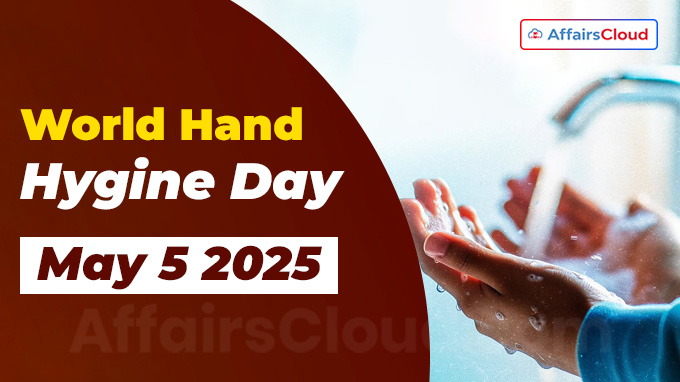 World Hand Hygiene Day (WHHD) is a global initiative led by the World Health Organization (WHO) celebrated annually on May 5 to raise awareness about the importance of understanding and practicing proper hand hygiene at the right moments to help prevent a wide range of infectious diseases.
World Hand Hygiene Day (WHHD) is a global initiative led by the World Health Organization (WHO) celebrated annually on May 5 to raise awareness about the importance of understanding and practicing proper hand hygiene at the right moments to help prevent a wide range of infectious diseases.
2025 Theme:
The theme for WHHD 2025 is “It might be gloves. It’s always hand hygiene”.
- This year’s focus underscores the critical importance of proper hand hygiene practices in healthcare settings, emphasizing that wearing gloves does not replace the need for hand hygiene.
Background:
i.The WHHD aligns with the’ SAVE LIVES: Clean Your Hands’ campaign, which aims to reduce healthcare-associated infections (HAIs) by promoting evidence-based hand hygiene practices globally.
ii.This campaign originated from the WHO First Global Patient Safety Challenge: Clean Care is Safer Care in 2009.
- The 2025 campaign marks the 17th anniversary of this global initiative, reinforcing nearly two decades of efforts to improve hand hygiene standards in healthcare settings worldwide.
iii.Over the years, it evolved into the WHO Infection Prevention and Control (IPC) Hub & Task Force, which coordinates global efforts to strengthen IPC practices.
2025 Campaign Objectives:
1.Promote WHO’s 5 Moments for Hand Hygiene: Ensure healthcare workers follow the WHO 5 Moments technique (before patient contact, after exposure to bodily fluids, etc.) and use gloves only when necessary.
2.Strengthen IPC Programs: Incorporate hand hygiene into national IPC strategies and facility-level Standard Operating Procedures (SOPs).
3.Reduce Waste Through Education: Raise awareness about the environmental costs of unnecessary glove use, aligning with global sustainability goals
Key Focus Areas for 2025:
1.Integration of Hand Hygiene into National Policies
The 2025 campaign coincides with the WHO Global Action Plan and Monitoring Framework 2024–2030, urging countries to adopt IPC strategies.
- By 2026, hand hygiene compliance monitoring must be established as a national indicator in all reference hospitals, a target currently met by 68% of countries.
2.Environmental Impact of Glove Misuse
Overuse of medical gloves contributes to healthcare waste, with an average university hospital generating 1,634 tons of waste annually—a figure rising by 2–3% yearly post-COVID-19.
3.Universal Access to Water, Sanitation, and Hygiene (WASH)
The WHO Framework for Action 2024–2030 links WASH and waste management to climate resilience, advocating for their integration into healthcare planning and financing
Impact of Hand Hygiene on Healthcare:
i.Hand hygiene is a fundamental practice in preventing HAIs
ii.Following proper hand hygiene practices, as outlined in the WHO’s ‘5 Moments for Hand Hygiene’, is crucial not only for patient safety but also for protecting healthcare workers.
iii.Effective hand hygiene can prevent 50–70% of HAIs, including severe infections such as sepsis, which leads to 11 million deaths annually worldwide.
Points to Note:
i.According to the Global Report on Infection Prevention and Control 2024 from the World Health Organization (WHO), 17 out of 20 countries (85%) in the Region of the Americas that participated in a 2023–2024 global survey have an active national infection prevention and control (IPC) program.
- With respect to hand hygiene compliance, 15 countries (75%) have designated it as a key national indicator, an increase from 62.5% in the 2021–2022 period.
ii.On average, seven out of every 100 patients in high-income countries and 15 in low- and middle-income countries will acquire at least one healthcare-associated infection during their stay in acute care hospitals.
iii.Globally, the Organisation for Economic Co-operation and Development (OECD) and WHO estimate that, by 2050, these infections could cause nearly 3.5 million deaths annually, 4.4 times more than deaths from Human Immunodeficiency Virus (HIV)/ Acquired Immuno Deficiency Syndrome (AIDS)and sexually transmitted diseases combined in 2021.
About World Health Organization (WHO):
Director-General (DG) – Tedros Adhanom Ghebreyesus
Headquarters – Geneva, Switzerland
Established – April 7, 1948




